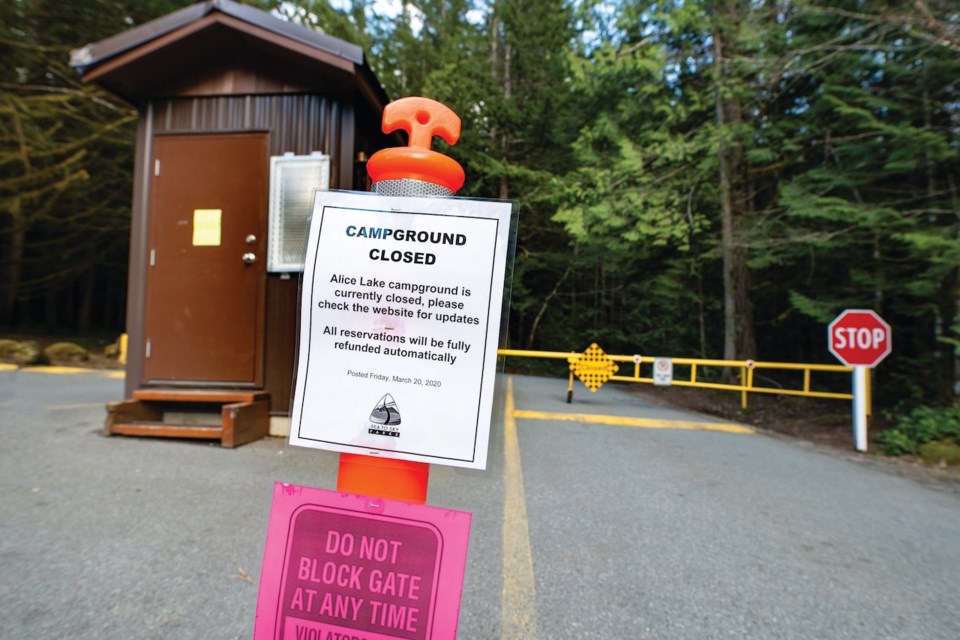After more than a month of blocked gates, taped-off trailheads and padlocked parking lots, on May 14, British Columbians woke to the news that BC Parks was rescinding an earlier decision to ban all access to our public lands.
As the subject of widespread dismay when the policy was first implemented, that the system-wide closure has now been reversed even before the provincial state of emergency is over shows just how arbitrary this decision was in the first place.
In ordering all parks to close, executive director of BC Parks, Robert Austad claimed that he had done so on the advice of the B.C. government’s medical experts —asserting that his department was closely “following the recommendations set out by the provincial health officer and the minister of health.”
But this does not seem true.
The Provincial Health Officer Dr. Bonnie Henry’s messaging on the public health benefits of outdoor recreation has been consistent since the start of the COVID-19 pandemic.
On March 13, while opining on the importance of spending time in the open air, Dr. Henry noted that “this virus does not transmit when people go outdoors.”
On April 29, she echoed this statement, stating that the overwhelming majority of COVID-19 cases had been traced, not to outdoor settings, but to clusters of people “in close proximity indoors.”
Asked about it again on April 30, Dr. Henry made the point even clearer. “Being outside is important for us to be able to release when we’re going through stressful times,” she said, adding, with special emphasis, “it was not me who closed the parks.”
Given then that Dr. Henry’s evergreen advice clearly contradicts Austad’s justifications, one wonders why this decision was made in the first place — especially on grounds of public health. Some observers have retrospectively speculated that the decision to close was a staffing or budgetary issue (a “clean washrooms” problem) — but this week’s re-opening seems to disprove that.
Even more damning for BC Parks, a May 12 response to a freedom of information request for communications to and from BC Parks and the Ministry of Health show that neither medical experts nor the BC Centres for Disease Control epidemiologists had been consulted in the months prior to the closure of the parks — a remarkable revelation when one considers the enormous social impact of this decision.
So why was this recreation-preventing decision made? One logical possibility is that instead of seeking out sage medical advice on viral transmission in green spaces (“infinitesimally low,” according to Dr. Henry), the system-wide closure was a knee jerk response to mounting community hysteria that outdoor activities, in and of themselves, were an imminent threat to public health.
Throughout March and April in B.C., the COVID-19 information environment was even more feverish than it is today. On social media, Facebook pages, outdoor users groups and lifestyle magazines had begun issuing their own “advisories” beyond and on top of the BC Centre for Disease Control official advice. Meanwhile, social media influencers had deployed to trailheads and to Instagram in order to spread the word about the novel coronavirus — posting incorrect information about the stability of SARS-CoV-2 on surfaces like bin lids, handrails, and access ladders. Much of this vigilante advice spread quickly — often outpacing the speed with which official information could be disseminated.
In my capacity as a working anthropologist, my job during this crisis has involved monitoring the impact of misinformation on our society as we ride out the COVID-19 pandemic.
Much like an infectious disease, one thing we know about misinformation is that it can transmit “virally” through networks, undergoing rapid mutation (like a game of broken telephone) as it spreads. In the context of COVID-19, the impact of misinformation has been observed prominently in the proliferation of online conspiracy theories among anti-lockdown activists. At their most extreme, these warped ideas have led to the destruction of 5G cell phone towers.
But misinformation can also be less insidious — as seen, for example, in the public’s confusion about social distancing versus self-isolation versus isolation (which are all different prevention categories). It’s worth pointing out that no one is immune in this eco-system of misinformation. Indeed, even within government, the interdepartmental transmission of error-laden information seems to have been something of a problem during this emergency, such that Dr. Henry’s advice to stay local led to BC Parks construing that the entire system should be closed immediately.
The social repercussions of this closure, hidden though some may be, should not be understated. Certainly, in some communities, the consequences of this decision have been more than unfortunate. With park closures forcing the population indoors, health-promoting outdoor activities have been taboo for months — even when done safely, socially-distantly and locally. In particular, social media is now a platform for publicly shaming “selfish” recreators — an unfortunate development, which has ramped up local anxiety and compounded the effect of an emergent mental health crisis whose curve we are only now beginning to model.
The worst thing about BC Parks’ closure then is that it vindicated this misbegotten behaviour, providing a thin veneer of officialdom to a growing public attitude that was thoroughly antithetical to the common good. In times of crisis, the role of government is to be a steadying force in society: a steely-eyed quantum of evidence-based policy-making where the advice of specialists is valued first and foremost. In this, BC Parks has decisively failed. Indeed, that a public body was seemingly more attentive to the whims of social media influencers than it was to the advice of the provincial health officer speaks not only to a deafness to expertise but also to a fundamental failure of government.
British Columbians deserve better.
Christopher Elliott is a Squamish resident and PhD researcher at King’s College London.



